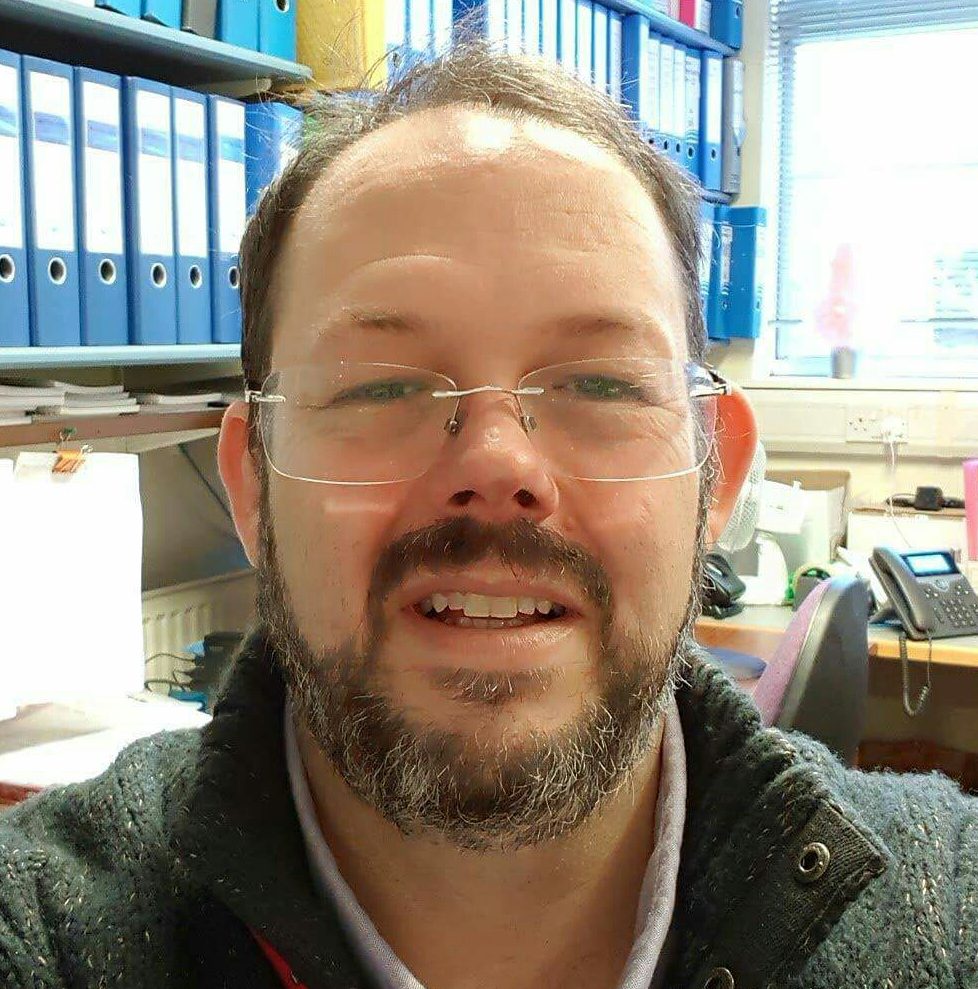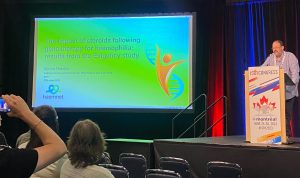All go for Haemnet at ISTH 2023
The International Society for Thrombosis and Haemostasis (ISTH) is an organisation of clinicians and scientists sharing new discoveries, enhanced understanding and best practices, to improve the lives of people with bleeding and clotting diseases. This year, its annual conference was held at the Palais des Congrès in Montréal, Canada – and I was pleased to attend, along with my Haemnet colleagues Kate and Sonia, to share some of our recent study findings.
Presenting GT360
Haemnet’s Glanzmann’s 360 study (GT360) has been looking at the impact of living with Glanzmann’s Thrombasthenia, a rare genetic bleeding disorder affecting around 1 in a million people. Having presented early study data at the EAHAD congress earlier this year, ISTH was an opportunity to go into more depth in a series of three posters. These reported on interim findings from the GT360 international patient survey, 19 qualitative interviews with people with Glanzmann’s Thrombasthenia, and the impact of heavy menstrual bleeding and obstetric bleeding on women with Glanzmann’s.
It was a pleasure to present these posters in person and answer questions from delegates. Many wanted to understand not just what causes the disorder and how it might be treated, but what it means to actually live with it. Haemnet’s 360 studies are designed for just that purpose. In the coming months, we look forward to sharing our findings from GT360 more widely in a series of publications.
Steroids (and me) in the spotlight
The Tuesday of the congress saw me give my first ever oral presentation at ISTH, on findings on the impact of steroids following haemophilia gene therapy from Haemnet’s Exigency study. Presenting to peers is something that we all have to do – but for me there is nothing more daunting than standing up at the front of an auditorium, looking out over a sea of faces, many of whom you know and respect, wondering, “Am I going to be able to tell them anything they don’t already know?” I’m pleased to say, though, that our findings were well received (despite a few technical hitches).
The negative effects of steroids are well known, and the people we spoke to during Exigency who had taken part in a gene therapy were made aware of these. However, some individuals and their families were unprepared for the reality of having to take steroids and how this might affect them. Not everyone who has haemophilia gene therapy will need steroids – but it’s clear that they should all be fully informed as to the potential effects and that support should be in place to help them through what may be a difficult time.
Highlights from the cutting edge…
Of course, there was much for us to learn too. Each day of the ISTH congress is filled with sessions on cutting edge scientific advances shared by some of the best in their field. It’s a packed programme that runs over five days, from 7am till 7pm. As hard as I tried, it would have been simply impossible to see everything I wanted to. So, I settled on a targeted approach, trying to home in on the sessions I felt were most relevant to my current research – and then caught up with Kate to find out about the sessions she had attended!
Gene therapy and the next generation of haemophilia treatments
There’s no doubt that gene therapy for haemophilia remains a hot topic. I heard about the new and novel methods of delivering gene therapy that are being explored, which may improve its effectiveness (increasing factor expression and longevity) and reduce the risk of liver inflammation. It’s early days in terms of the development of these new technologies, but I have no doubt we’ll hear much more over the next couple of years. And despite gene therapy’s high profile, a number of sessions discussed other new treatments that may mean people with haemophilia A and B can achieve near-normal factor levels. With a growing number of therapies bringing more choice, I wonder if it has ever been more possible for people with haemophilia to choose the treatment that most allows them to live the life they want.
New treatments and new ways of treating for ITP
Over the course of the congress, there were several sessions about the rare autoimmune bleeding disorder ITP (immune thrombocytopenic purpura) and the new classes of drug treatments that may soon be available. One session also looked at some existing and related treatments, asking if it might be possible to use them in new ways to treat ITP. It’s a valuable reminder that treating conditions effectively isn’t always about developing new treatments, and that it may be possible to use existing treatments in a smarter way. Future treatment strategies for people with ITP are therefore looking brighter too.
…And evidence of a need for more research
 That said, the striking thing for me is that fatigue remains a persistent and troubling symptom for people with ITP – I heard one affected person saying they feel this is neither well understood nor adequately researched. For any rare condition, it’s not just about treatment; it’s also important that we understand much more about what it’s like to live with it – which means there is a need for more data on lived experience.
That said, the striking thing for me is that fatigue remains a persistent and troubling symptom for people with ITP – I heard one affected person saying they feel this is neither well understood nor adequately researched. For any rare condition, it’s not just about treatment; it’s also important that we understand much more about what it’s like to live with it – which means there is a need for more data on lived experience.
One of the sessions I was keen to go to but couldn’t fit in was about Factor X (FX) deficiency – but Kate did go, and she shared some of what she’d learned with me. FX deficiency is an ultra-rare bleeding disorder, but there is now a targeted treatment available in many countries in the form of FX concentrate. Despite this, it seems that it remains difficult to access FX concentrate in the US (the richest country in the world) and many people with FX deficiency have reported a significant number of bleeds that have gone untreated. Again, you have to ask what impact this has on their lives, particularly for women who reported heavy menstrual bleeding – which again points to a need for more lived experience research.
Roll on ISTH 2024
Next year the ISTH congress will be held in Bangkok in Thailand. Haemnet hopes to be there to highlight and report on findings from both ongoing and new projects. We hope to see you there too.
If you would like to know more about Haemnet’s Exigency or GT360 studies, including our presentations at ISTH, please email research@haemnet.com
About the author
Simon Fletcher is Principal Researcher at Haemnet Ltd. Email simon@haemnet.co

Scan the QR Code to follow us on Social Media
Photographs: Simon Fletcher and Sonia O’Hara, Haemnet
Question marks image: Shutterstock/Syverarts Vectors



